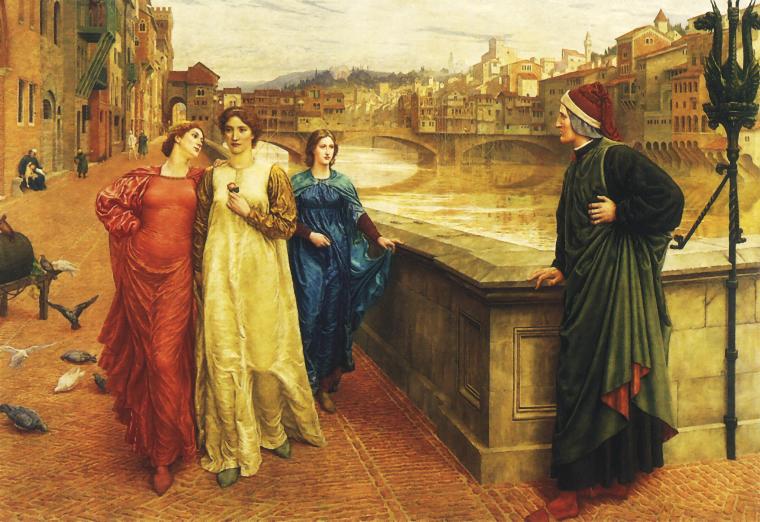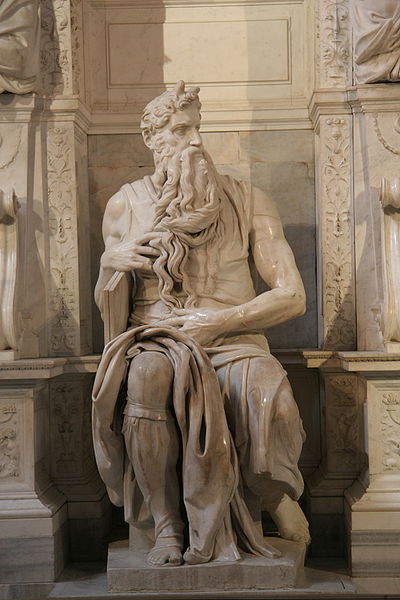Beyond the widest of the circling spheres
A sigh which leaves my heart aspires to move.
A new celestial influence which Love
Bestows on it by virtue of his tears
Impels it ever upwards. As it nears
Its goal of longing in the realms above
The pilgrim spirit sees a vision of
A soul in glory whom the host reveres.
Gazing at her, it speaks of what it sees
In subtle words I do not comprehend
Within my heart forlorn which bids it tell.
That noble one is named, I apprehend,
For frequently it mentions Beatrice;
This much, beloved ladies, I know well.
Dante, La Vita Nuova, Sonnet 25
The story of Dante and Beatrice at first glance does not seem like a very appealing romance. The two characters never get around to developing a deep, emotional relationship. In fact, it may have even been one-sided on Dante's part. And it has a tragic ending when Beatrice dies at the age of 24 after having married somebody else. Not exactly satisfying.
At the same time, it is one of my favorite love stories. Dante was prevented from ever actualizing his love for Beatrice, but he still considered it the most significant relationship of his life. He never lost sight of her beauty. Not because she was a lovely person in and of herself (although I'm sure she was); instead, Dante saw mirrored in his human love for Beatrice the divine love of God. He went on to flesh this out in the Divine Comedy as he makes his journey from Hell to Heaven to be reunited with Beatrice as she leads him to the presence of God Himself. As they travel through the heavens, her beauty increases as they move closer to Christ.
While much of this is clearly allegory, the thing that makes it so forceful for me is how deeply it echoes reality. It wasn't till I was in college and witnessed the dating frenzy myself that I realized just how powerful a girl's influence is over a guy. The stories of Solomon and David being brought down by the women they fell for have acquired a very poignant edge as I've now watched it happen before my eyes. I've also seen how much good a godly girl is able to accomplish through her influence on a young man (even when romantic interest isn't a factor). Beatrice was not afraid to call Dante out when he failed. She maintained a high level of intelligence and self-respect. She was also a kind, gracious individual. She challenged Dante. I think as girls, we tend to underestimate just how important these qualities are in our relationships with guys, be it brother, friend, or partner.
In contrast with our culture's abysmally-low expectations, we should appreciate how beautiful it is when people point one another to Christ in their relationships. There's a reason the Bible describes the relationship between Christ and the Church in the language of marriage. Divine love makes human love more beautiful, and human love offers a deeper understanding of divine love.
This summer, I came across this sonnet by John Donne which completely reminded me of Dante's view of Beatrice. What a legacy.
Since she whom I loved hath paid her last debt
To Nature, and to hers, and my good is dead,
And her soul early into heaven ravishèd,
Wholly on heavenly things my mind is set.
Here the admiring her my mind did whet
To seek thee, God; so streams do show the head;
But though I have found thee, and thou my thirst hast fed,
A holy thirsty dropsy melts me yet.
But why should I beg more love, whenas thou
Dost woo my soul, for hers offering all thine:
And dost not only fear lest I allow
My love to saints and angels, things divine,
But in thy tender jealousy dost doubt
Lest the world, flesh, yea, devil put thee out.
John Donne, Holy Sonnet 17



